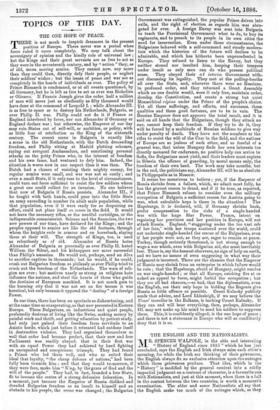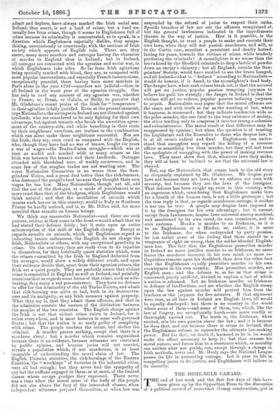• THE ENGLISH AND THE NATIONALISTS.
MR. SPENCER WALPOLE, in the able and interesting "History of England since 1815" which he has just concluded, says the English and Irish always miss each other's meaning, for while the Irish are thinking of their grievances, the English always fix an exclusive attention upon the outrages which those grievances produce. That idea, which in the " History " is modified by the general context into a coldly impartial judgment on a contrast of character, is a favourite one with Nationalists, and just at this moment, when there is a lull in the contest between the two countries, is worth a moment's examination. The abler and saner Nationalists all say that the English make too much of the outrages which, as they
admit and deplore, have always marked the Irish social war. Ireland, they assert, is not a land of crime, but a land un- usually free from crime, though it seems to Englishmen full of crime because its criminality is concentrated, so to speak, in a direction which Englishmen especially dislike, they sympa- thising, unconsciously or consciously, with the sections of Irish society which approve of English rule. There are, they assert, many more murders and outrages having the character of murder in England than in Ireland ; but in Ireland, all outrages are connected with the agrarian and social war, in which Englishmen take sides. So far from Irish agitations being specially marked with blood, they are, as compared with most popular insurrections, and especially French insurrections, exceptionally peaceful, there having been more murders in Paris alone in the year 1792—murders not judicial—than in all Ireland in the worst year of the agrarian struggle. One has only to read any account of any agrarian war, whether in France, or Berne, or Galicia, or Sicily, to perceive that Mr. Gladstone's recent praise of the Irish for " temperance " in their agitation is fully justified. Even at the present moment, urge Nationalists, the outrages in Ireland are not directed against landlords, who are considered to be only fighting for their own advantage, but against tenants who break the unwritten agree- ment of the country-side, and while benefiting in their rents by their neighbours' exertions, are traitors to the combination which can alone make those neighbours successful. Nor are the Irish, they say, even cruel as compared with the English, who, though they have had no war of tenure, fought for years a war of wages—the Trades-Union struggle—which was at least as sordid and marked with as many crimes as the Irish war between the tenants and their landlords. Outrages attended with bloodshed were of weekly occurrence, and in some few of the rougher trades are not wanting now. The worst Nationalist Committee is no worse than the Saw- grinders' Union, and a great deal better than the rick-burners, who destroyed the people's food because they thought their own wages far too low. Many Nationalists, though not all, add that the use of the shot-gun as a mode of punishment is no more cruel than that of the bludgeon, which Englishmen would think natural ; and that the mutilation of animals which creates such horror in this country, would in Italy or Southern France be hardly noticed, and is, as Mr. Dillon said, far more merciful than assaults on human beings.
We think any reasonable Nationalist—and there are such persons, seldom as they come to the front—would admit that we had stated their defence fairly ; but it rests upon an entire misconception of the drift of the English charge. Except as regards assaults on animals, which all Englishmen regard as indicating innate callousness, the English do not charge the Irish, Nationalists or others, with any exceptional proclivity to crime. On the contrary, they are ready even to do injustice to themselves, for they habitually quote statistics which, were the crimes committed by the Irish in England deducted from the averages, would show a widely different result, and upon their evidence decide that, apart from their agrarian crimes, the Irish are a quiet people. They are perfectly aware that violent crime is committed in England as well as Ireland, and painfully conscious that as regards some forms of that crime, such as wife- beating, they enjoy a sad pre-eminence. They have no defence to offer for the criminality of the old Trades Unions, and admit that rich-burning was quite as bad, both in its destructive- ness and its malignity, as any Irish menaces against property. What they say is, that they admit these offences, and that in the admission consists the essence of the distinction between the peoples of the two countries. The English charge against the Irish is not that violent crime exists in Ireland, for it exists everywhere, and is most heinous in some well-governed States ; but that the nation is so easily guilty of complicity with crime. The people condone the crime, and shelter the criminal. A murder proves nothing, except that there is a murderer about ; but a murder which remains unpunished because there is no evidence, because witnesses are terrorised by public opinion, and because juries will not convict, reveals a population which, if not murderous, is at least incapable of understanding the moral claim of law. The English Unionist atrocities, the rick-burnings of the Eastern Counties, the " wreckings " of factories in the industrial cities, were all bad enough ; but they never had the sympathy of any but the ruffians engaged in them, or at most, of the limited classes whose savage grudges they expressed. There never was a time when the moral sense of the body of the people did not rise above the fury of the interested classes, when independent witnesses perjured themselves, or when law was
suspended by the refusal of juries to respect their oaths. Specific breaches of law are not the offences complained of, but the general lawlessness indicated in the impedimenta
thrown in the way of justice. How is it possible, is the English thought, to trust a people to make and execute their own laws, when they will not punish murderers, and will, as in the Curtin case, manifest a persistent and deadly hatred, lasting for years, towards the victims of crime, while tenderly pardoning the criminals ? A moonlighter is no worse than the bravo hired by the Sheffield criminals to drop a bottle of powder down an enemy's chimney ; but all England, outside the Saw- grinders' Society, would have exulted to see the bravo hanged, and all Ireland—that is, " Ireland " according to Nationalists— would do honour, if it dared, to the moonlighter's dead body. The danger here, when such crimes break out, is that the accused will get no justice, popular passion tempting jurymen to believe his guilt too strongly ; the danger in Ireland is that the victims will get no redress, popular passion inducing jurymen to acquit. Nationalists may argue that the moral offences are the same, and with truth as far as the wresting of law, when it happens, is concerned ; but they indicate tendencies wide as the poles asunder, the one fatal to the very existence of society, the other tending only to compress it into too strong a cohesion and submissiveness. The moral result of that difference may be exaggerated by opinion ; but when the question is of trusting the Legislature and the Executive to those who despise law, it is at all events radical and final. Englishmen can under- stand that smugglers may regard the killing of a revenue officer as something less than murder, but they will not trust the apologists of smuggling with the power of making revenue laws. They must show first that, whatever laws they make, they will at least be inclined to see that the universal law is obeyed.
But, say the Nationalists, that comes back to the old story so eloquently explained by Mr. Gladstone. We despise your laws not because they are laws, for we enforce our own with severity, but because they are the laws of the foreigner. That defence has been caught up, even in this country, with an eagerness which, considering that Englishmen make laws for a fourth of the human race, is not a little grotesque ; but the true reply is that, as regards murderous outrage, it neither is nor can be true. A people may despise laws imposed on it by the foreigner for his own advantage ; but it cannot, except from lawlessness, despise laws universal among mankind, and sanctioned by its own creed, its own conscience, and its own customs. Murder is murder to an Irishman, as it is to an Englishman or a Hindoo, or, rather, it is more to the Irishman, for when undegraded by party passion, he has rather more of the feeling that there should be a vengeance of right on wrong, than the colder-blooded English- man has. The fact that the Englishman proscribes murder in Ireland no more justifies murder to an Irishman, no more leaves the murderer innocent in his own mind, no more ex- tinguishes remorse upon his deathbed, than does the other fact that the Englishman equally proscribes murder to his own countrymen in his own country. Man proscribes murder, not English man ; and the defence is, as far as that crime is concerned, purely artificial, devised to explain a fact of which a nation is ashamed. Let an Irishman murder an Irishman in defence of landlordism, and see whether the English stamp upon the law against murder will protect him from the lynchers or the jurymen for five minutes. If that argument were true, as all laws in Ireland are English laws, all would be equally disobeyed ; but there is no country in the world where some of them—and some of them, too, which, like the law of forgery, are exceptionally harsh—are more readily or thoroughly carried out. The truth is, the Irishman, when excited, sets his own passion above the law ; and it is because he does that, and not because there is crime in Ireland, that the Englishman refuses to surrender the ultimate law-making power. But for that, we doubt if, harassed as he is, he would make the effort necessary to keep it ; but that arouses his moral nature, and forces him to a resistance which, as morality can neither alter nor perish, can, except through a change in Irish methods, never end. Mr. Healy says the National League passes its life in preventing outrage. Let it pass its life in compelling juries to do justice, and Englishmen will believe in its sincerity.



































 Previous page
Previous page